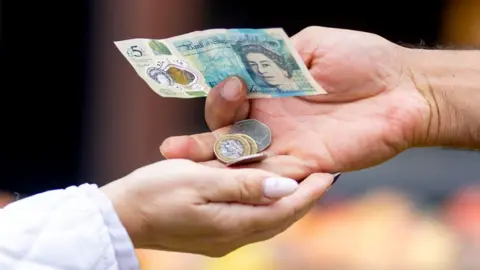Now one in every five store purchases is made in cash

 getty images
getty imagesThe use of cash in stores has increased for the second consecutive year after a decade of decline, according to retailers.
Notes and coins rose by a fifth in transactions last year, as shoppers found cash helped them budget better, the British Retail Consortium (BRC) said.
The amount spent per purchase also fell slightly from £22.43 in 2022 to £22.03 last year, it said.
The findings were published after charities told a committee of MPs that many groups were being excluded from essential services and community spaces which had begun refusing cash.
She cited issues for women in abusive relationships whose partners use the bank account as a form of control or to monitor their activities.
Deidre Cartwright, policy manager at the charity Surviving Economic Abuse, said: “Often access to cash is really the only means of accessing the essentials they and their children need.
“It’s a means for them to be able to escape their abuser, especially when that abuser can track them through a bank account, so it’s incredibly important for their safety and survival.”
The Treasury committee heard that some older people and those with mental health problems were also more comfortable using cash, or simply did not have the digital skills or mental capacity to work with cards, computers or phones.
From leisure centers to universities go cash-free
Charities said exclusions were seen across a wide range of services and locations.
Mencap Cymru director Wayne Crocker said people could have the option of going to alternative cafes if someone else in the town decided to stop accepting cash.
However, if the only theater in town – or the theater located at the university – becomes cash-free, some of the more vulnerable people will no longer be able to go there.
Ron DelNevo of the Payment Choice Alliance said leisure centres, parking services and catering on public transport were among the many services that could no longer accept cash.
“We have some heart-wrenching stories of families of people with disabilities who feel that when they don’t have cash accepted, it is robbing them of their self-esteem,” he said.
“It was their money and they had the right to spend it, and they’re being told their money is now worthless. They take that to mean they’re no good anymore.”
BRC said all major retailers are committed to accepting cash in their stores.
Data published by banking trade body UK Finance in July showed that the majority of young people pay for things using smartphones or watches.
Nearly three-quarters (72%) of 18 to 24 year olds regularly use their digital wallet to make contactless payments.
But it also found that the number of people who mainly used cash for everyday expenses reached a four-year high due to the cost of living.
This was supported by the latest data from BRC.
“Persistent inflation and the cost of living crisis are affecting households across the country and many consumers are looking to budget more effectively with cash,” said Chris Owen, payments policy adviser at BRC.
The trade body wants regulators to take meaningful action on the fees charged by card companies.
Small businesses have also called on banks to keep branches open or provide adequate facilities to allow them to deposit cash.
Banking data shows that cash remains the second most popular method of payment after debit cards.
Stricter rules have been announced by the City watchdog, the Financial Conduct Authority (FCA), to ensure banks and building societies have access to cash.
It said its new rules would require banks and building societies to take measures such as filling gaps in cash access when considering branch closures. banking centerATM and post office facilities.





